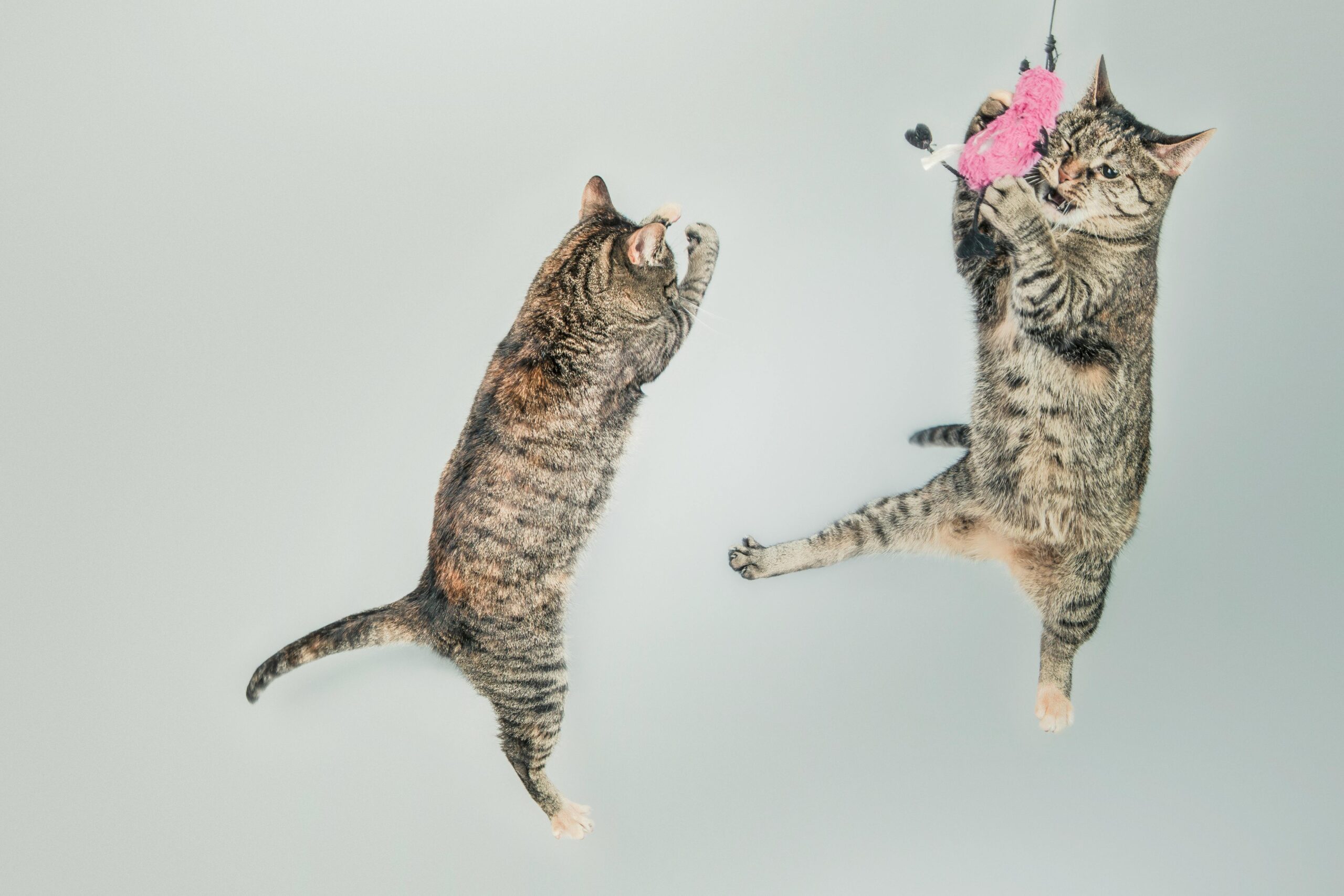Unsurprisingly, cats are known for their jumping abilities despite their small nature.
They can jump 6-8 feet their height while the average cat jumpers can jump 5-6 feet their height.
In simple contrast, they can jump as high as the world record-holder human who jumped 8.03 feet in 1993.
Meanwhile, some other breeds of cats such as Bengal can be able to jump even higher cause of their body build and athleticism.
However, their propensity to jump is mostly influenced by fear.
Fear is a common emotion in all animals including humans. The way and manner in which it is expressed varies in animals and humans.
While other animals like dogs can express their fear by barking and or attacking, Cats due to their high sensitivities and instincts, express fear by jumping.
Cats do have strong smell, hearing, and sight senses which makes them easily alert to faint noises and movements and their natural reflex is to jump when they perceive any danger or threats.
This natural behavior exhibited by cats has given them the name “Scared Kittens”‘.
Their natural behavior is a defensive means of escaping any known danger or threats posed by any actor in their environment.
Why Do They Jump When Startled:

While dogs might bark when scared, and lions might roar or growl lowly, cats express their fears by jumping off the ground.
Below are some reasons why a cat may jump when startled.
1. Protective Natural Reflex :
The reflex nature of cats is unmatched among all other domestic animals.
whenever they perceive any threats or danger, they quickly react by jumping off the floor or away from the threats.
2. Visual Stimuli:
Cats respond swiftly to visual stimuli. Any quick change in movement, the tiniest of sounds from an object falling off can cause a shock and a reflex to jump.
This sensitivity also allows them to spot prey, predators, and any disturbances in their environment quickly.
3. Powerful Sense Of Hearing:
Bats, elephants, owls, whales, dolphins, moths, and cats are all known for their exceptional hearing prowess.
Cat’s ears can swivel independently in the direction of sounds which makes them great predators.
They can also detect the frequencies of sounds accurately. However, this makes them very startled.
4. Health Issues:
Cats that are nursing injuries, experiencing discomfort, pains, allergies, and being sick are more startled as a natural response to their physical condition.
5. Escape Response:
Every prey and predator has their own behavior when they encounter any threat.
In cats, Jumping when startled is their innate survival mechanism when faced with a difficult situation or against a threat.
6. Muscular Reflexes:
Every animal including humans has both voluntary and involuntary actions.
Cats do experience reflex actions that make them easily startled which results in a jump
How Do I Know When My Cat Is Startled:
1. Hiding: Cats just like babies when playing love to play hide and seek. Unlike babies, they don’t hide for fun but when they are startled or feel threatened.
They may hide under the bed, furniture, closets or anywhere they may feel secure.
2. Avoidance Of Eye Contact: When they cannot excuse themselves from a place, they avoid eye contact with other cats, objects, animals, or even humans to avoid confrontations.
3. Vocalisations: Cats do express their startled emotions by producing sounds which can be from hissing to screams, and loud yowls.
4. Panting: This is an expression of extreme fear in cats which can arise from pains or severe distress just as in dogs.
It can also be likened to human behavior when they engage in high mental and physical activities.
5. Urination and Defecation: When faced with extreme threats or danger, they may lose control of their voluntary actions to withhold their bladders and bowels.
6. Confrontations: When extremely terrified they can easily lash out at their perceived opponents with their claws and teeth to have a pound of flesh.
7. Increased Heartbeat: Their heart rate will be faster than normal when they are terrified which can be felt by close observation.
8. Body Signs and Language: Some cats may arch their back while others hunch to make them appear smaller usually as a defensive or submissive response to fear.
Hunching their backs makes them less noticeable which makes them less of a target for any predator.
Also hunching of backs enables them to sprint faster to escape or protect themselves defensively
9. Freezing: when frightened, they tend to freeze to make themselves non-noticeable.
They may flatten their ears and stay low to the ground.
What Should I Do When My Cat Is Startled:
It is important for a cat to feel safe and secure in their environment. Here are some practical steps to take to help your cat feel safe.
- Ample Space: Allow your cat to retreat to their safe, comfortable, and protected area. This could be their favorite hiding spot, such as under the bed, a piece of furniture, or in a closet. Avoid coercing them to open spaces when they are startled
- Provide a Safe Haven: Set up a cozy environment with their bed where they can feel safe. Place their favorite items like their toys and a piece of your personal belongings that has your scent nearby to provide comfort, tranquility, and peace.
- Avoid Loud Noises and Sudden Movements: loud noises and sudden movements startle cats easily. Everyone in the same space should be conscious of their activities.
- Be Patient: Give your cat ample time to calm down at their convenience. dictating the tone will only make them more frightened.
- Consult with a Veterinarian: If your cat unusually or constantly experiences severe fear or anxiety, or if their attitude changes suddenly and significantly, it’s best to consult with a veterinarian. They can help diagnose if it’s an underlying health predicament and provide possible and accurate guidance on managing your cat’s anxiety.
- Offer Nice Treats and Food: If your cat is receptive, offering treats or their favorite meals can help them associate the situation with a positive feeling. However, don’t provide unhealthy foods to please them or coerce them to eat if they are not willing.

